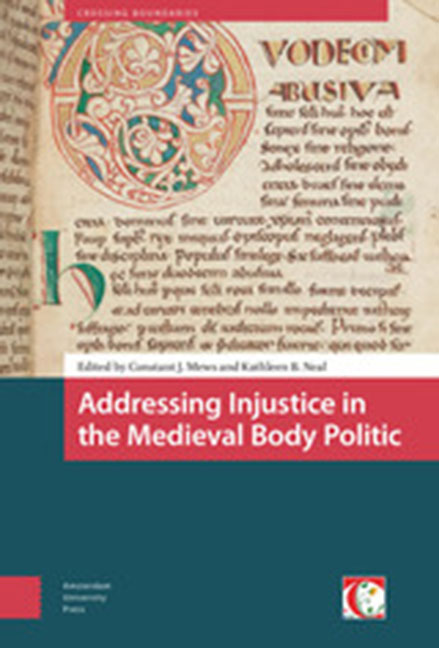Book contents
- Frontmatter
- Contents
- Acknowledgements
- Abbreviations
- Note on References
- List of Tables and Illustrations
- Introduction: Justice and its Abuse in the Medieval Body Politic
- 1 The De XII abusiuis saeculi: Contexts and Textual Traditions
- 2 The Irish Background to the De XII abusiuis saeculi
- 3 ‘Each in the Calling to Which They are Called’: Images of Authority in the De XII abusiuis saeculi
- 4 Transforming Irish Traditions: De XII abusiuis saeculi and Justice in the Frankish World, c. 750–1050
- 5 The Unjust King and the Negligent Bishop: Addressing Injustice in Eleventh and Twelfth-Century England and Germany
- 6 Reflecting on Abuses in Religious Life: From The Twelve Abuses of the Cloister to The Cloister of the Soul
- 7 Preaching the Body Politic: John of Wales and Franciscan Political Thought in the Late Thirteenth Century
- 8 Justice and Its Abuses in the Speculum justiciariorum
- 9 Addressing Abuses and Injustice in the Court of Philip the Fair: The De informatione principum of Durand of Champagne
- 10 ‘Perfect Justice Weighs Everything on a Balanced Scale’: Italian Friars on Equity, the Common Good, and the Commune c. 1270–c. 1310
- 11 Some Late Franciscan Rewritings of the Twelve Abuses
- Appendix: On the Twelve Abuses of the Age A Translation
- Bibliography
- Index of Biblical References
- Index of Manuscripts
- General Index
Appendix: On the Twelve Abuses of the Age A Translation
Published online by Cambridge University Press: 14 February 2024
- Frontmatter
- Contents
- Acknowledgements
- Abbreviations
- Note on References
- List of Tables and Illustrations
- Introduction: Justice and its Abuse in the Medieval Body Politic
- 1 The De XII abusiuis saeculi: Contexts and Textual Traditions
- 2 The Irish Background to the De XII abusiuis saeculi
- 3 ‘Each in the Calling to Which They are Called’: Images of Authority in the De XII abusiuis saeculi
- 4 Transforming Irish Traditions: De XII abusiuis saeculi and Justice in the Frankish World, c. 750–1050
- 5 The Unjust King and the Negligent Bishop: Addressing Injustice in Eleventh and Twelfth-Century England and Germany
- 6 Reflecting on Abuses in Religious Life: From The Twelve Abuses of the Cloister to The Cloister of the Soul
- 7 Preaching the Body Politic: John of Wales and Franciscan Political Thought in the Late Thirteenth Century
- 8 Justice and Its Abuses in the Speculum justiciariorum
- 9 Addressing Abuses and Injustice in the Court of Philip the Fair: The De informatione principum of Durand of Champagne
- 10 ‘Perfect Justice Weighs Everything on a Balanced Scale’: Italian Friars on Equity, the Common Good, and the Commune c. 1270–c. 1310
- 11 Some Late Franciscan Rewritings of the Twelve Abuses
- Appendix: On the Twelve Abuses of the Age A Translation
- Bibliography
- Index of Biblical References
- Index of Manuscripts
- General Index
Summary
This translation updates that offered by Aidan Breen in his 1988 PhD thesis alongside his critical edition of DDAS, supplemented by reference to the most reliable manuscripts (in particular U Cambridge, CUL Ii.1.41). The layout of individual sentences reflects the use of end-rhyme to define phrases within these sentences (except where scriptural passages are being cited). Sentences are often written as couplets, although sometimes they are longer for rhetorical effect. Direct citations from scripture are identified within notes, as are allusions to scripture and other sources. Inevitably, translation into English can never capture the full nuance of the Latin, as with the terms iustitia (righteousness as well as justice) and uirtus (strength as well as virtue), here rendered as moral strength. The signs < > refer to rubrics not in the original Latin text.
<Prologue>
1. A wise man without good works
2. An old man without religion
3. A youth without obedience
4. A rich man without almsgiving
5. A woman without modesty
6. A lord without moral strength
7. A contentious Christian
8. A proud pauper
9. An unjust king
10. A negligent bishop
11. Common folk without discipline
12. A people without law
Thus, justice is suffocated. These are the twelve abuses of the age through which the wheel of the age, if one is within it, is deceived and without any impeding support of justice, is propelled into the darkness of hell through the just judgement of God.
<1. A wise man without good works>
1. Firstly, if a wise man and preacher is without good works, he neglects to carry out in actions what he teaches in words; hearers despise acting on the sayings of teaching when they perceive that the actions of a preacher do not match a preacher's words.
2. ‘The authority of one giving instruction never becomes effective unless he fixes onto the heart of a listener by effective action’, especially when the teacher himself, if he has fallen into the love of vice,
disdains applying to his wounds the medicine of another teacher.
3. Hence the Lord himself in the Gospel, wishing to give instruction in both teaching and good works, warned the disciples to exercise such caution, saying:
For if the salt has lost its savour,
with what shall it be salted?
- Type
- Chapter
- Information
- Addressing Injustice in the Medieval Body Politic , pp. 325 - 352Publisher: Amsterdam University PressPrint publication year: 2023



